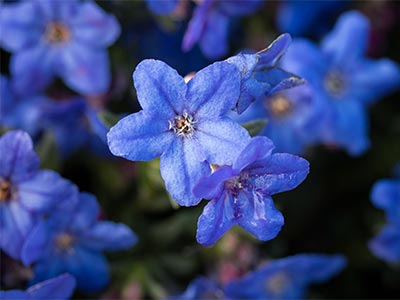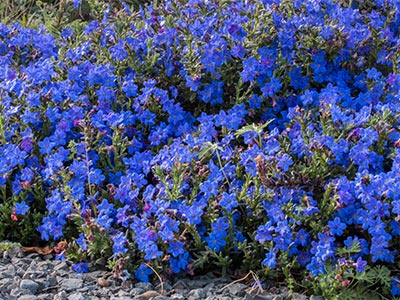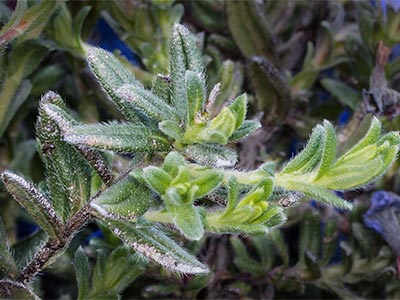Lithodora 'Grace Ward'
- Scientific Name: Lithodora diffusa ‘Grace Ward’
- Garden: Lawn Alternatives Garden
- Plant Type: Herbaceous Perennial
- Evergreen/Deciduous: Deciduous
- Sun/Shade Exposure: Part Shade
- Moisture Requirements: Moist, well-Drained
Plant Information
‘Grace Ward’ is a vigorous popular cultivar featuring deep blue flowers on woody prostrate branches clad with dark green leaves. Differences between this cultivar and the straight species are often minor.
Culture
Best grown in humusy, moist, fertile, acidic, well-drained soils in light to moderate shade. Tolerates full sun in cool summer climates, but appreciates some part shade at the heat of the day in hot summer climates. Soils should not be allowed to dry out. Thrives in Mediterranean-type climates on slopes or raised beds. Generally dislikes the hot and humid conditions of the deep South. Apply a winter mulch in the northern parts of the growing range.
Noteworthy Characteristics
Lithodora diffusa, commonly known as lithodora, is a prostrate, multi-branched ground cover which typically grows to 6–10” tall but spreads over time to 24–30″ wide. It is native to scrubby areas and woodland margins from southwestern Europe along the Mediterranean to Turkey and south to Morocco.
Tiny, 5-petaled, funnel-shaped flowers (to 1/2″ wide) are an intense blue with slightly darker reddish purple stripes. Flowers bloom from late spring to early/mid-summer (May to early August), sometimes with minor sporadic additional bloom to fall. Woody prostrate branches are densely clad with narrow, sessile leaves (1/2 to 1″ long by 1/4″ wide) which are dark green above and gray-green beneath. Leaves and stems are hairy. Leaves remain evergreen in warm winter climates.
Problems
No frequently occurring insect or disease problems. Damping off is its primary disease problem. Watch for aphids.
Data Source
https://www.missouribotanicalgarden.orgPlant Photos







